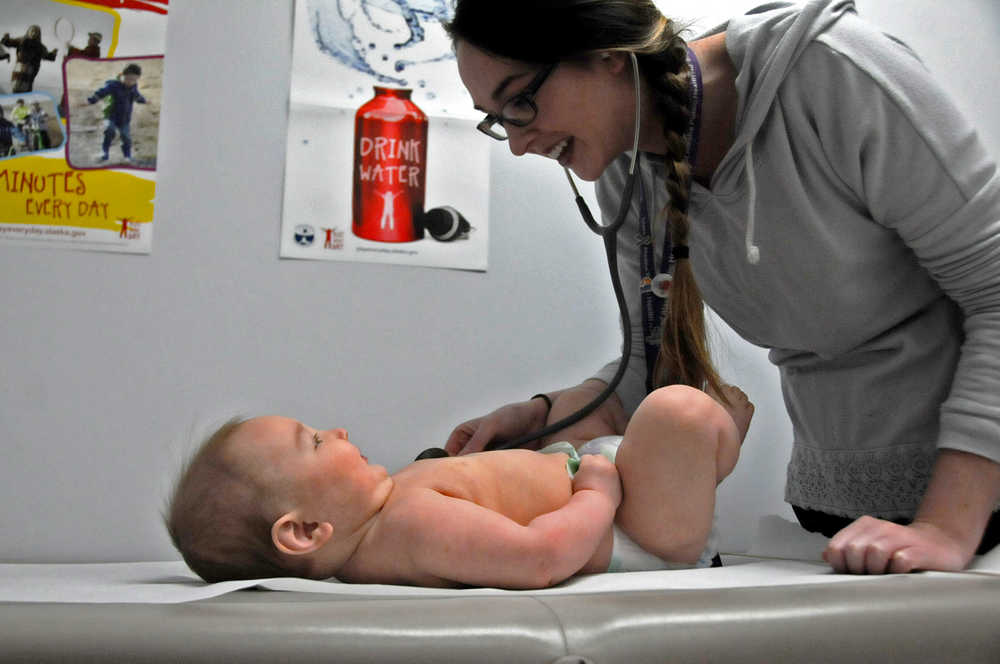Whooping cough is a fairly preventable disease, but once in a while it resurfaces and makes inroads into communities in Alaska.
Health care workers started noticing an uptick in pertussis activity in Homer around Feb. 1. Pertussis is endemic — always present somewhere — in the U.S. population, but when it starts to pick up, providers notify the Alaska Section of Epidemiology.
That was how the Homer Public Health Center heard about it, said nursing team leader Lorne Carroll. The center worked with local media to respond and host a vaccine drive, he said. Pertussis, or whooping cough, can affect people of any age, though it is most serious in infants younger than 12 months old.
Pertussis is a vaccine-preventable disease — a fairly easy one, Carroll said. Children receive between four and five shots by 7 years old and then one booster for adults age 18 or older. That’s why it can be perplexing when there is an outbreak, he said.
“Folks who choose not to take the vaccine are at considerably higher risk of getting (pertussis),” Carroll said.
Another outbreak in Alaska in the autumn of 2014 left 39 people in an Interior community ill. One curious thing about the 2014 outbreak was that, upon investigation, 90 percent of people who were ill had been vaccinated. Researchers have been studying similar cases of pertussis in vaccinated people since at least 1996, when cases of pertussis in fully-vaccinated people began to emerge.
More recent research showed the effectiveness of the vaccine may wane over time, becoming less effective sooner than previously thought. Those who get the vaccine are still more protected than an unvaccinated population, however. Those who are up to date on vaccines also experience less severe cases of the disease if they do catch it, according to a 2012 bulletin from the Alaska Section of Epidemiology.
There are no vaccines that ensure 100 percent immunity, but they at least reduce the chances of getting the disease in the first place, said Tammy Marsters, a public health nurse at the Kenai Public Health Clinic.
“They still have some protection, just not as much as we would like,” Marsters said. “In the medical world, we all want (100 percent immunity), but there just isn’t … what we do know is that when you do get these shots, if you do get the disease, it will be a lesser case of it.”
Vaccines are one of the most studied pieces of medicine, but despite much of the research supporting the recommended schedule, many parents opt for an “alternative” schedule, Marsters said. It is hard to say what an alternative schedule does to the effectiveness of vaccines, but one thing it does do is stretch the experience out for children, she said.
“There’s no proven benefit to it,” Marsters said. “In fact, we don’t even know what it does to do it that way, because if we do it (the recommended) way, we know it works.”
When parents choose not to vaccinate their children for personal reasons, it can also reduce herd immunity — the epidemiological concept that when most of a population is immune to a disease, it has less of a chance of affecting those who are not immune. Some children cannot have vaccines because of immune disorders, so when otherwise healthy kids do not have vaccines, it could possibly endanger those children, Marsters said.
Alaska is slightly behind the nationwide percentage for children between 19-35 months who have received the full seven-vaccine series, according to the 2014 National Immunization Survey data from the Centers for Disease Control and Prevention, the most recent data available. The national average is approximately 71.6 percent; Alaska came in at approximately 67.3 percent.
A significant number of Alaska’s children are also behind on their vaccinations. As of March 2015, Alaska’s immunization coverage for 2-year-olds lagged behind other states, possibly because of low access or hesitancy to vaccinate, according to a report from the Alaska Section of Epidemiology.
Marsters said the public health centers in Alaska provide services on a sliding fee scale — while the services are not free, they can work with the patients to provide services in a way they can afford.
The state has also been searching for savings on vaccines. In 2014, former Gov. Sean Parnell signed into law the formation of an Alaska Vaccine Assessment Account and Program, a joint buying program that changes the way vaccines are paid for in the state.
Matt Bobo, the deputy program manager for the Section of Epidemiology’s Immunization Program, said the AVAP is more like a funding source and partners with private insurers and purchases the vaccines in bulk to save money.
“Private insurance companies pay an assessment, and based on the pay-in, the state of Alaska purchases vaccines,” Bobo said. “I’d like to parallel it to the Sam’s Club or the Costco of buying vaccines. You can buy it at a bulk rate so it’s a better deal.”
Marsters said on the ground, the AVAP doesn’t change much about how vaccines are provided. The state did implement one program that is a major help, though — the VacTrAK online database has been “a godsend,” she said. If a patient doesn’t have their records, VacTrAK can help provide more information, she said.
The VacTrAK requires that all providers report administered immunizations to the state. Bobo said the data from the system analyzing vaccination rates in the state is still being analyzed. For now, the best information comes from the Centers for Disease Control and Prevention’s National Immunization Surveys.
“Especially in this community, we have a lot of people who … either their doctors have left town or quit practicing and for some reason the moms don’t have vaccination record, so the kids may end up getting more shots than they need,” Marsters said. “With this new state immunization registry, all the providers put the immunizations they have given, and we have it.”
Reach Elizabeth Earl at elizabeth.earl@peninsulaclarion.com.

